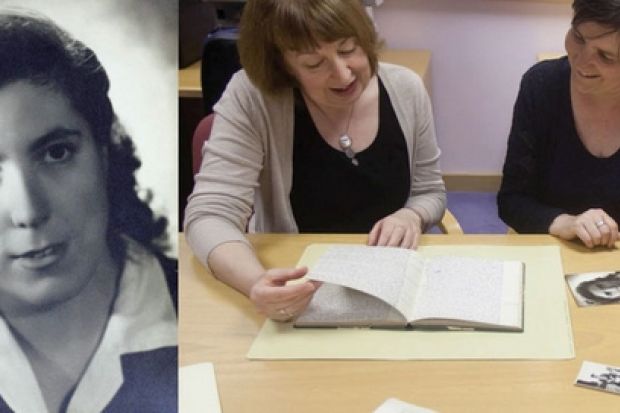Primary source: scholars examine the diary of Madeleine Blaess (left) that details life under the jackboot
The remarkable diary of an academic who spent the Second World War in occupied Paris is now being made into a film.
Born in France to French parents, Madeleine Blaess (1918-2003) grew up in Yorkshire and graduated from the University of Leeds in 1939. In October of that year, she set out to do postgraduate work at the Sorbonne.
She fled Paris when the Nazis took over the city in June 1940. But although she was an Englishwoman in all but name, Blaess returned to spend the whole occupation period there. She kept a daily diary, around 50,000 words in total, right up to Paris’ liberation in August 1944 and beyond.
By February 1945 she was back in England and spent most of her working life, from 1948 to 1983, in the department of French at the University of Sheffield. It inherited her papers when she died and Jacky Hodgson, head of special collections, found the diary and other war-related material under Blaess’ bed.
Three years ago, Wendy Michallat, lecturer in French at Sheffield, saw the diary listed in the library’s catalogue and decided to take a closer look. Although it required a good deal of deciphering – after a friend and flatmate in Paris was arrested and interned, Blaess had been careful not to reveal too much – it proved to be a fascinating historical resource.
While there are many other first-hand accounts of Paris during the Occupation by German forces that describe food shortages, deportations and bombing raids, observed Dr Michallat, “very little has been written about the life of female students, and hers is the only account we have by someone who was effectively a British student”.
She added: “She had a very interesting circle of friends including Sylvia Beach [the first publisher of James Joyce’s Ulysses and founder of Shakespeare and Company]. She was approached by personalities who played a prominent role in the Resistance.”
One of these was academic and Resistance leader Georges Auclair, who met Blaess several times.
“She describes him as a man on a mission who wanted to know if she had guts. She later told people how she would make rooms available for shot-down Allied airmen while counterfeit papers were being prepared,” Dr Michallat said.
When the American forces reached Paris, she added, Blaess described “going down into the street in her pyjamas” and recounted “her fascination with GIs”.
Sheffield created a daily Twitter feed from the diary, with striking entries such as “30 May 1942: Sirens from 1-15 am til 3.45. Thought it was a storm. Tifferneau took me for lunch and tried to get me drunk. No fruit or veg.”
But now Dr Michallat, who already uses the diary in her courses on life writing and cultural history, has secured funding from the university to create a documentary about Blaess.
The film will be coordinated by documentarist Jo Cammack, while Terry O’Connor, professor of contemporary theatre and performance practice at Sheffield, will oversee the staging and performance of diary extracts, with archive footage used to provide historical context.
Students will have the chance to acquire audiovisual skills by assisting in transcribing, translating, filming, subtitling and editing the project. The film will also feature interviews with members of the Sheffield branch of the University of the Third Age who knew Blaess and remember some of the things she told them about her life in Paris.
Register to continue
Why register?
- Registration is free and only takes a moment
- Once registered, you can read 3 articles a month
- Sign up for our newsletter
Subscribe
Or subscribe for unlimited access to:
- Unlimited access to news, views, insights & reviews
- Digital editions
- Digital access to THE’s university and college rankings analysis
Already registered or a current subscriber? Login




